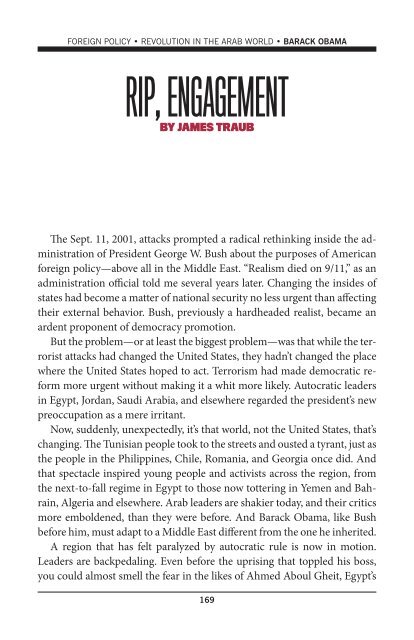Revolution in the Arab World - Observation of a lost soul Blog
Revolution in the Arab World - Observation of a lost soul Blog
Revolution in the Arab World - Observation of a lost soul Blog
You also want an ePaper? Increase the reach of your titles
YUMPU automatically turns print PDFs into web optimized ePapers that Google loves.
foreign policy • revolution <strong>in</strong> <strong>the</strong> arab world • barack obama<br />
RIP, Engagement<br />
BY JAMES TRAUB<br />
The Sept. 11, 2001, attacks prompted a radical reth<strong>in</strong>k<strong>in</strong>g <strong>in</strong>side <strong>the</strong> adm<strong>in</strong>istration<br />
<strong>of</strong> President George W. Bush about <strong>the</strong> purposes <strong>of</strong> American<br />
foreign policy—above all <strong>in</strong> <strong>the</strong> Middle East. “Realism died on 9/11,” as an<br />
adm<strong>in</strong>istration <strong>of</strong>ficial told me several years later. Chang<strong>in</strong>g <strong>the</strong> <strong>in</strong>sides <strong>of</strong><br />
states had become a matter <strong>of</strong> national security no less urgent than affect<strong>in</strong>g<br />
<strong>the</strong>ir external behavior. Bush, previously a hardheaded realist, became an<br />
ardent proponent <strong>of</strong> democracy promotion.<br />
But <strong>the</strong> problem—or at least <strong>the</strong> biggest problem—was that while <strong>the</strong> terrorist<br />
attacks had changed <strong>the</strong> United States, <strong>the</strong>y hadn’t changed <strong>the</strong> place<br />
where <strong>the</strong> United States hoped to act. Terrorism had made democratic reform<br />
more urgent without mak<strong>in</strong>g it a whit more likely. Autocratic leaders<br />
<strong>in</strong> Egypt, Jordan, Saudi <strong>Arab</strong>ia, and elsewhere regarded <strong>the</strong> president’s new<br />
preoccupation as a mere irritant.<br />
Now, suddenly, unexpectedly, it’s that world, not <strong>the</strong> United States, that’s<br />
chang<strong>in</strong>g. The Tunisian people took to <strong>the</strong> streets and ousted a tyrant, just as<br />
<strong>the</strong> people <strong>in</strong> <strong>the</strong> Philipp<strong>in</strong>es, Chile, Romania, and Georgia once did. And<br />
that spectacle <strong>in</strong>spired young people and activists across <strong>the</strong> region, from<br />
<strong>the</strong> next-to-fall regime <strong>in</strong> Egypt to those now totter<strong>in</strong>g <strong>in</strong> Yemen and Bahra<strong>in</strong>,<br />
Algeria and elsewhere. <strong>Arab</strong> leaders are shakier today, and <strong>the</strong>ir critics<br />
more emboldened, than <strong>the</strong>y were before. And Barack Obama, like Bush<br />
before him, must adapt to a Middle East different from <strong>the</strong> one he <strong>in</strong>herited.<br />
A region that has felt paralyzed by autocratic rule is now <strong>in</strong> motion.<br />
Leaders are backpedal<strong>in</strong>g. Even before <strong>the</strong> upris<strong>in</strong>g that toppled his boss,<br />
you could almost smell <strong>the</strong> fear <strong>in</strong> <strong>the</strong> likes <strong>of</strong> Ahmed Aboul Gheit, Egypt’s<br />
169




